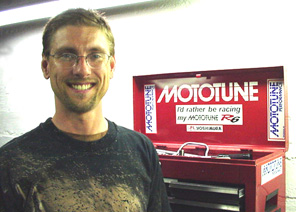
MotoMan

Presents:
Harley
Power !!!
Improving The Harley Davidson Superbike !!
|
|
Harley
Power !!!
|
Just like Harley-Davidson, I was born in Milwaukee, Wisconsin. That's not
enough for me to cheer for them, though. It has a lot more to do with my wanting
to see the "underdog" pull out a victory !!!
I believe the basic ingredients are there... and with just a little
tweaking:
Harley - Davidson Will
Win.
One of the problems with dyno testing is that it fails to take into account
what actually happens on the racetrack. This kind of thinking usually makes power
& speed seem mysterious.
These first 2 pix were taken last summer at the Brainerd AMA national, and I posted them
under the Brainerd racing coverage. The point of the story was to show that
the pipes on the Harley weren't the same color, because the fuel / air ratio was
different from the left pipe to the right pipe...
Then, I asked the question:
Can anyone see an even bigger problem ??
Well, it's been almost a year, and no one's guessed it. As you scroll down I'll
explain the problem and reveal the answer.
See if you can figure out what it is.
All you have to do is:

Think Outside of The Box !!
|
Pic
1 It's a V Twin engine, and like the
Harley, it has an individual pipe for each cylinder. |
|
|
Pic
2
The color difference means that one cylinder is possibly correct, but they
can't both be right. |
|
Now
For The Bigger Problem ...
(Actually there are 2. )
|
Aerodynamics This toy model is from the original Harley VR1000
superbike. Although the 2000 VR1000 has 2 exhaust silencers, the problem
is still the same. |
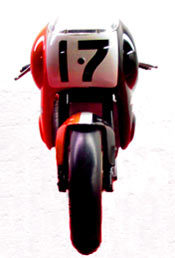 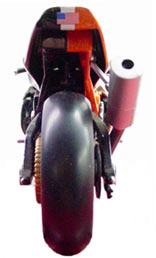 |
3 Aerodynamic Forms
Imagine the wind is flowing from left to right:
|
The Plate. |
The Bowl. |
The Raindrop. This is the most aerodynamic form. |
This Principle is Important
to Understand:
The
cone
that forms behind the raindrop is
the most significant part of the aerodynamic form !!
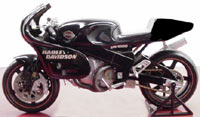
This side view of the original HD superbike will help to illustrate the problem.
Enter The Secret Mototune
USA Wind Tunnel !!
( Note: I realize there isn't a rider in
the "wind tunnel." For this demonstration it's unnecessary. )
The
air is flowing over the bodywork and rider in approximately the same ideal
teardrop shape.

The tail section and the rider help to form
the cone.
Unfortunately, this doesn't even come close to simulating what
happens on the
racetrack.
Why ???
Because the bike isn't running !!!
So...
Let's Turn Off The "Wind"
& Fire Up The Bike !!
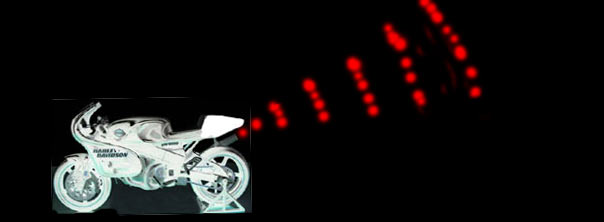
Ooops.....
At 11,000 RPM
there's a big problem ! Look at the angle of the exhaust flow ...
The huge 500cc pulses of exhaust gasses are putting a new force into the
aerodynamic equation.
O.K...
Now let's Turn the "wind" back on again to see
what's really happening on the racetrack...
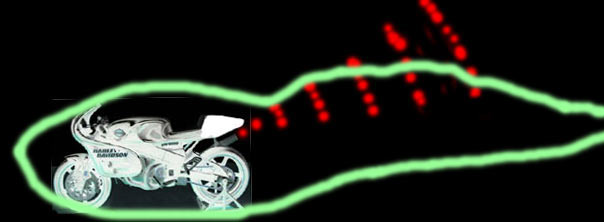
The exhaust gasses are pushing upward...
So the
cone
can't
form properly.
Notice that it "tries" to form,
but now it's much further back.
The aerodynamics are disrupted by the direction of the exhaust gasses. That's
one reason the Harleys aren't as fast. The bike is fighting itself.
PLUS: The wake it produces is larger and further
back than most bikes.
That gives the bikes behind it a huge advantage
!!
So not only is it fighting itself, it effectively gives the other bikes
More Power...
By making it:
"Super - Draftable"
It doesn't matter
how much power the VR 1000 makes on the dyno...
The faster it goes, and the higher the RPM's are...
the more
it's design slows itself down
and
...the easier it is for Honda, Ducati, Suzuki, Yamaha, and Kawasaki riders to draft past.
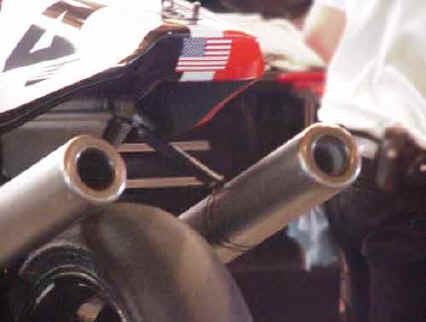 |
The downslope of the tailsection is correct. The upslope
of the exhaust gasses cancel out the ideal teardrop aerodynamic form. Without the directional outlets of the competition's
exhaust design, the gasses exit upwards, rather than backwards. |
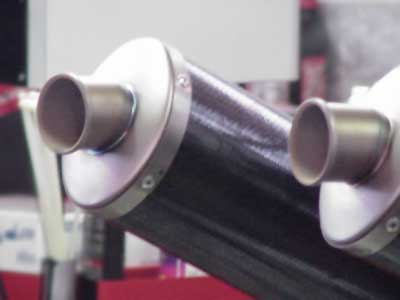 |
Now it's easy to understand why the Harley VR1000 should use this pipe
design. The silencers' outlets are simply pointing in the direction of the
bike's aerodynamic wake. |
|
There's another, closely related problem ... |
Think About The Answer !! |

Have a Cool Day Everyone !!
~ MotoMan
Next Article: Dynamic Aerodynamics !